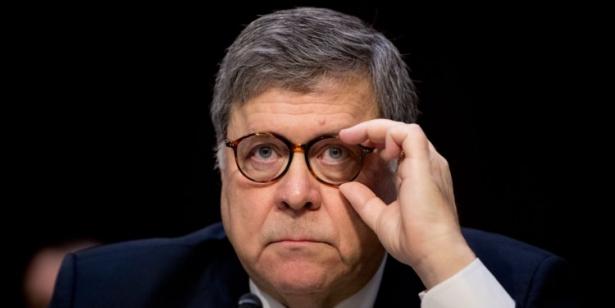Dishonest. While the words “misleading,” “biased, ” or “partisan” might also work, dishonest is the word that best describes the speech Attorney General William Barr gave to the Fraternal Order of Police this week. Many missed the disturbing point of the speech, because they were more concerned with the few lines about the death of alleged child sex trafficker Jeffrey Epstein on Barr’s watch. But to be sure, it was a dishonest broadside against much of the criminal justice reform effort that Republican and Democratic state and local governments – as well as bipartisan alliances in Congress – have been engaged in for the last few years.
The audience was not a surprise. The Fraternal Order of Police (FOP) and its local organizations, largely white male organizations, have vocally opposed virtually all criminal justice reform efforts. Despite enormous financial and technical assistance to law enforcement, the FOP largely created the false narrative that the administration of President Obama created a “war on cops,” largely because of efforts to ensure compliance with the Constitution through consent decrees and other police reforms. In New York, the police union head announced that he was “sick and tired of giving in to minority groups, with their whims and their gripes and shouting.” In Chicago, where an officer shot and killed Laquan McDonald and lied about it, an FOP member declared that the officers “should’ve shot 18 .”
Shortly after Donald Trump was elected president, the FOP sent him a list of reforms it wanted, and President Trump has mostly complied. Barr knew his audience and basically gave a campaign speech.
Let’s start with the tired trope of “just a few bad apples.” The question is not whether most law enforcement officers are good people who have volunteered to do courageous and dangerous work. That is a fact, as shown most spectacularly by what just happened in Philadelphia. The issue is that too many law enforcement officers engage in criminal conduct and take actions that call into question their fairness and fitness for their jobs— from murder to rape to possession of child porn to offensive social media posts, to laughing while a man dies under their restraint, to celebrating the Ku Klux Klan.
By doing so they cast a shadow on the far larger segment of law enforcement personnel who have integrity and are the essence of public service. There are people from all walks of lives who engage in criminal conduct and are not fit for their jobs. But the difference is that others do not have the authority to instantly take someone’s life or liberty. With great power comes great responsibility. With great power comes the absolute need to dissect the conduct of officers when it leads to death—something Barr criticized.
Barr’s call for absolute compliance with unjust police commands can basically be read as a license to kill. The DOJ’s Civil Rights Division used to provide comprehensive reports to explain declinations in high-profile police-involved fatalities. It appears that these are no longer necessary because Barr made it clear that he intends to overrule the career employees of the Division if the officers faced any non-compliance, regardless of the kind of non-compliance or the amount of force used.
While the Eric Garner case is the most recent example, it is noteworthy that the Civil Rights Division has not brought a single new prosecution in a police use of force case in the six months since Barr has sat atop the Department.
Barr takes particular issue with the newer crop of duly-elected reform prosecutors. His is a specious critique considering the Republican Party claims to believe in local rule and autonomy. And, it should be noted that Barr has never actually personally prosecuted a case or done a jury trial, criminal or civil —ever.
Without any evidence, Barr told the FOP that reform prosecutors will lead to more crime. The fact is that prosecutors are seeing drops in crime. They are working to ensure that members of their communities are being treated fairly regardless of race or income and using their discretion to not criminalize low-level offenses and conduct that is better handled by the health care system.
In Chicago, for example, violent crime has dropped by 8 percent under State’s Attorney Kim Foxx, who has smartly moved resources from low-level enforcement to address violence. In many ways, the movement to reduce incarceration was led by conservative states like Texas that saw that they could reduce both crime and incarceration. And if Barr truly cares about family stability, as his Moynihan Report-esque complaints seem to indicate, one would think that he would be looking for ways to keep all families together by reducing unnecessary incarceration.
Barr irresponsibly and inaccurately blamed officer injuries on movements and organizations that call attention to police brutality by noting that officer injuries rose to 60,000 in 2017. Barr provides no evidence of this claim. He must have forgotten that Donald Trump was president for almost all of 2017.
In fact, officer fatalities due to assault, the only truly credible data set on this issue, were lower under President Obama than under any of the four prior presidential administrations. At the height of the Black Lives Matter movement following the killing of Michael Brown in August 2014 and in 2015, “only” 50,000 officers were assaulted. So it seems President Trump’s return of “law and order” rhetoric is the cause of more officer injuries.
Barr’s speech is a slap in the face of the bipartisan effort to reduce the number of people that our country is locking up. Barr’s speech was not only dishonest; it was also wrong and dangerous.
Roy L. Austin, Jr. is a former deputy assistant to the president for urban affairs, justice & opportunity, a former deputy assistant attorney general in the Department of Justice, and a former federal prosecutor.


Spread the word